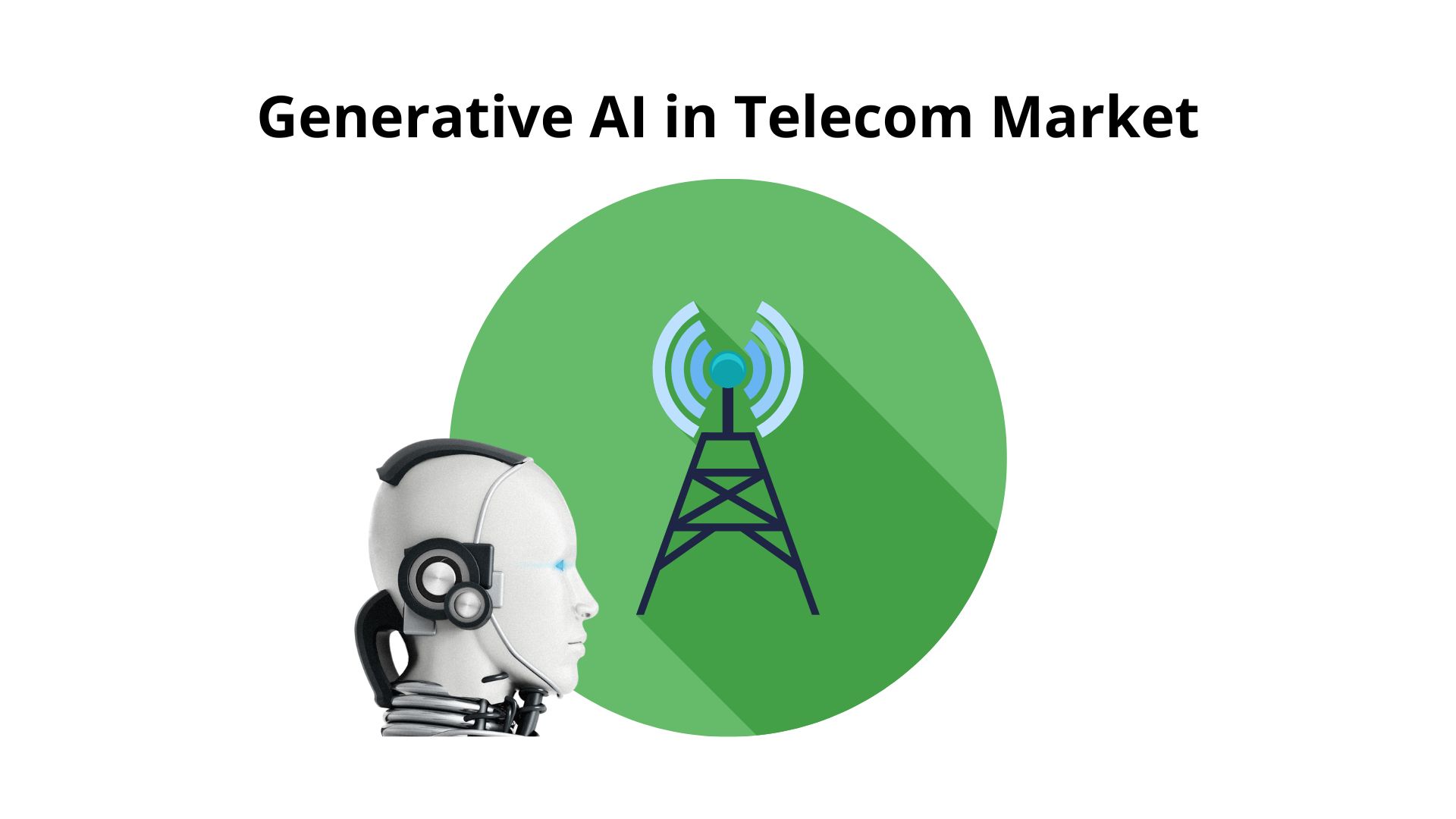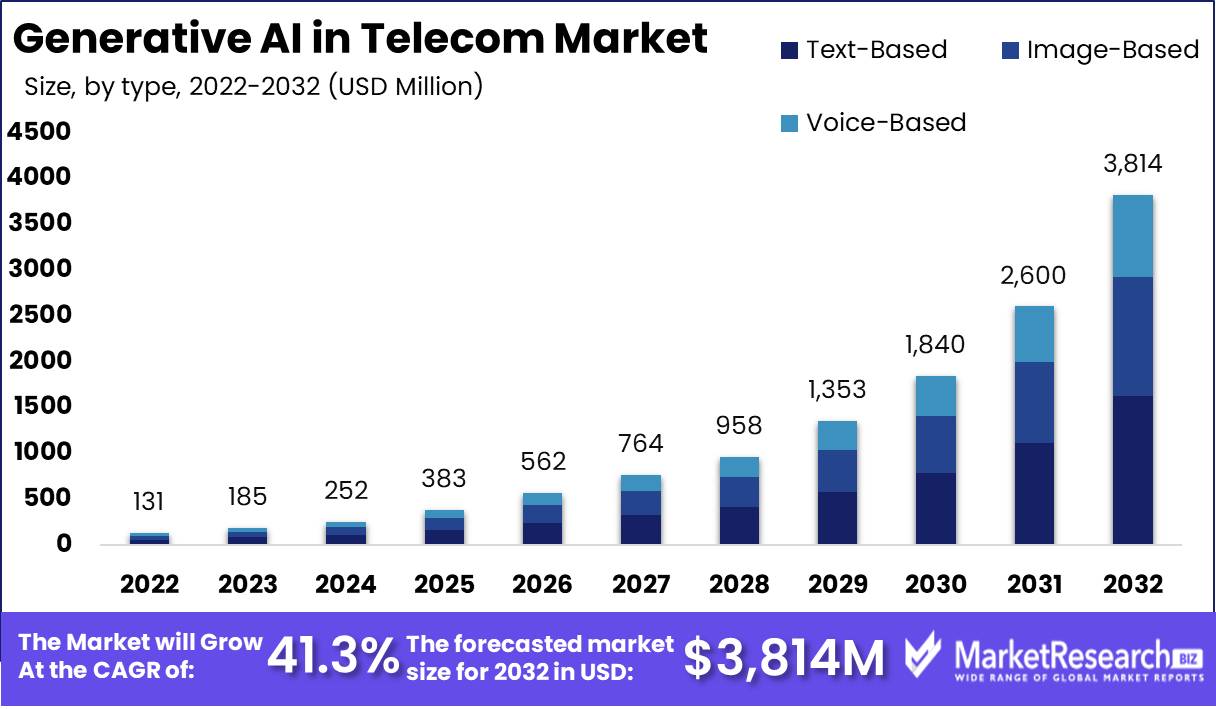Generative AI in Telecom Market Size is expected to be worth around USD 3814 Mn by 2032

Page Contents
Market Overview
Published Via 11Press : Generative AI in Telecom Market size is expected to be worth around USD 3814 Mn by 2032 from USD 131 Mn in 2022, growing at a CAGR of 41.3% during the forecast period from 2022 to 2032.
Generative AI has seen remarkable success in the telecom market over recent years. Generative AI refers to using artificial intelligence techniques such as machine learning to generate new content such as images, texts or even conversations based on patterns found within existing data. Within telecom networks and customer interactions this technology has proven its worth significantly; improving network management processes, personalizing interactions and conducting data analyses while saving significant costs in doing so.
One area in which generative AI has made a notable contribution is in network optimization and management. Telecommunication networks are complex networks comprised of millions of interconnected devices producing vast amounts of data; Generative AI algorithms can analyze this information to detect patterns that reveal network behaviors such as proactive maintenance needs or resource allocation requirements, providing insights from which operators can optimize network performance, reduce downtime, and enhance overall quality of service delivery.
Generative AI's primary role in the telecom market lies in customer experience enhancement. Operators strive to provide personalized services and increase customer satisfaction, using data analysis such as browsing behavior, call records and service usage patterns to generate personalized recommendations and offers for individual customer preferences – which in turn enhance customer engagement while building long-term loyalty among users.
Generative AI plays an integral part in data analysis and predictive modeling within the telecom sector. Telecom operators generate vast quantities of data, including call detail records, network logs, customer demographics and call logs; by employing generative AI algorithms they can extract valuable insights from this information in order to identify trends and make data-driven decisions; such insights may help predict network congestion, anticipate customer churn rates, optimize marketing campaigns or enhance revenue generation.
Generative AI has emerged as an innovative means of natural language processing and voice recognition, revolutionizing customer interactions. Virtual assistants powered by generative AI can recognize customer queries in a more humane and contextually aware manner, improving overall customer experiences by providing accurate information quickly, solving issues more efficiently, and decreasing human intervention needs.
Adopting generative AI into telecom market poses its own set of unique challenges. Privacy and security issues become paramount as generative AI relies heavily on large amounts of customer data that require protection under relevant data regulations, with the implementation of robust security measures being necessary in order to keep customer trust intact.
Request Sample Copy of Generative AI in Telecom Market Report at: https://marketresearch.biz/report/generative-ai-in-telecom-market/request-sample

Key Takeaways
- Reinforcing network optimization through intelligent traffic routing and dynamic resource allocation.
- Automation of customer support through artificial intelligence-powered chatbots and virtual assistants.
- Predictive maintenance to reduce network downtime and maximize infrastructure performance.
- Intelligent fraud detection and prevention systems designed to combat telecoms fraud.
- Customized marketing campaigns using AI analytics and customer behavioral insights.
- Strengthen network security through AI-powered threat and anomaly detection.
- Enhance network capacity planning and optimization using AI-powered predictive modeling.
- Intelligent network fault diagnosis and automated troubleshooting help accelerate problem resolution time.
- Voice assistants and recognition tools powered by AI provide users with an enhanced user experience.
- With advanced data analytics and predictive modeling techniques, network planning and expansion decision making becomes simpler with increased accuracy.
Regional Snapshot
- North America boasts advanced telecom infrastructure with extensive 4G and 5G coverage, and major players in this region have made innovations such as IoT, cloud computing, data analytics and artificial intelligence solutions to enhance network efficiency, customer experience and security.
- Europe is well known for its varied telecom markets, spanning highly developed nations such as Great Britain and Germany to emerging ones in Eastern Europe. Europe has made significant strides in rolling out 5G networks, opening up new applications across industries including healthcare, transportation and smart cities. European telecom providers are investing in AI to optimize network operations, increase service quality and deliver personalized offerings.
- Asia-Pacific is home to some of the fastest-growing telecom markets, such as China, India and Japan. Boasting massive consumer bases, these countries have led in 5G deployment and digital transformation efforts. Artificial Intelligence adoption rates are high across this region; virtual assistants, language processing services and predictive analytics being pioneered here by telecom companies that use AI as part of their strategy. They leverage this technology in order to meet varying consumer needs with tailored services.
- Latin America presents both developed and emerging telecom markets. Countries such as Brazil, Mexico and Argentina have seen substantial investments in telecom infrastructure that has resulted in greater internet penetration and mobile connectivity. AI adoption has been increasing with telecom companies using AI technologies for network optimization, customer service automation and fraud prevention purposes.
- Middle East and Africa present a varied telecom landscape with differences in infrastructure development and market maturity between countries. While some nations already possess well-developed telecom networks, others still lagging behind are expanding connectivity. AI is helping bridge this digital gap through innovative solutions like mobile banking, e-learning and telemedicine in underserved areas.
For any inquiries, Speak to our expert at: https://marketresearch.biz/report/generative-ai-in-telecom-market/#inquiry
Drivers
Enhanced Customer Experience
Generative AI holds great promise to transform customer experiences in telecom markets. By using AI algorithms, companies can utilize personalized and interactive customer interactions. Chatbots powered by Generative AI may understand customer preferences, and provide tailored recommendations and real-time support – ultimately improving the overall satisfaction and loyalty of their customer base.
Automation and Operational Efficiency
Generative AI allows telecom operators to increase operational efficiency by automating various processes and tasks, leading to increased automation. AI algorithms are particularly beneficial in network management, optimization, and troubleshooting tasks; by automating these processes telecom companies can reduce costs, minimize manual errors, and speed response times for network issues more quickly, thus creating more efficient operations that lead to greater reliability.
Network Optimization and Predictive Maintenance
Artificial intelligence can play a pivotal role in optimizing network performance and enabling predictive maintenance for telecom companies. AI algorithms can analyze vast volumes of network data, detect patterns, and offer advice to telecom operators for network optimization. By taking proactive measures against network issues before they arise, telecom operators can also ensure seamless connectivity while preventing service disruptions.
New Revenue Streams
Generational AI offers telecom companies exciting opportunities to develop new services, opening up additional revenue streams. AI-powered content generation enables telecom operators to offer personalized news articles, advertisements or entertainment directly to their customers through personalized AI content generation systems. By monetizing this AI content creation, telecom firms can diversify their revenue sources while increasing their competitive edge.
Restraints
Privacy and Security Concerns with Data Collection Systems
Generative AI relies on vast amounts of data for training and operation. This has raised concerns regarding privacy and security in the telecom market. Telecom operators should ensure sensitive customer data is safeguarded from unauthorized access or misuse through appropriate security measures, data anonymization techniques and compliance with relevant privacy regulations to address these concerns.
Ethical and Legal Considerations of Automation Technologies
Generational AI raises ethical concerns in the telecom market regarding authenticity and ownership of content created. Therefore, clear regulations must be established in order to ensure its responsible and ethical usage; transparency with customers regarding AI-generated content as well as copyright or plagiarism issues must also be prioritized when creating guidelines and regulations related to Generative AI content should also be considered crucial elements.
Limited Training Data
Generative AI models require large and diverse training datasets in order to produce high-quality output. Unfortunately, due to data privacy regulations and limited access to relevant sources, telecom operators have difficulty gathering such training sets, which may compromise both their performance and accuracy of Generative AI models. Telecom operators's must use techniques like data augmentation, transfer learning or collaborations in order to address this challenge and get their work out there for their users.
Technical Complexity and Know-How (TC&K)
Implementing Generative AI solutions into telecom market requires technical expertise and resources. From creating and deploying AI algorithms, to maintaining computational infrastructure needs and training and fine-tuning models – Generative AI implementation requires time, talent, resources and collaboration between both specialized personnel as well as AI specialists to navigate its technical complexities successfully. Telecom companies should invest in skilled personnel as well as collaborate with AI specialists when undertaking Generative AI implementation.
Opportunities
Personal Marketing and Advertising Services Provider
Generative AI allows telecom operatorss to create highly targeted marketing and advertising campaigns. AI algorithms can analyze customer data to generate targeted offers, content and recommendations to increase customer engagement and conversion rates, helping telecom companies effectively target specific customer segments while optimizing return on marketing investment returns.
Network Analytics and Optimization
Generative AI offers advanced network analytics for telecom operatorss, providing them with invaluable insights into network performance, user behavior and traffic patterns. By applying this knowledge effectively to their networks they can optimize infrastructure use, improve bandwidth allocation and deliver higher-quality service offerings for their customers resulting in increased customer loyalty and satisfaction.
Intelligent Virtual Assistants
Generative AI can power intelligent virtual assistants that enhance customer support and self-service capabilities, from chatbots and virtual assistants that handle customer inquiries to those that offer real-time assistance or can troubleshoot network issues. By automating customer support processes telecom operators can reduce costs, speed response times and ensure an improved customer experience.
Content Creation and Curation Services Available Now
Generational AI can streamline content creation and curation for telecom companies. AI algorithms can generate original and engaging blog posts, social media updates or product descriptions using predefined parameters or templates – helping telecom operators efficiently produce relevant material that engages with customers while building brand recognition and loyalty.
Take a look at the PDF sample of this report: https://marketresearch.biz/report/generative-ai-in-telecom-market/request-sample
Challenges
Ethical Use of AI
Attaining Ethical AI Gestaltung Ensuring ethical use of Generative AI is a major challenge in telecom. Content generated by AI-powered services must be clearly labeled and disclosed to customers for trust-building and to avoid misleading information. Telecom operators's must develop ethical guidelines and comply with regulations in order to reduce any ethical concerns surrounding AI-generated content.
Data Bias and Fairness
Generative AI models may be vulnerable to biases present in their training data, which could result in biased output or discriminatory behaviors. Telecom companies must be vigilant of potential biases and strive to ensure fairness and inclusivity within their AI systems; regular audits, diverse training datasets, and ongoing monitoring may provide useful solutions for this challenge.
Integration with Legacy Systems
Telecommunication operatorss frequently have complex legacy systems that present integration challenges when adopting Generative AI solutions. Bridging the gap between Generative AI systems and existing infrastructure, data formats and protocols requires careful planning, testing and possible retrofitting existing systems in order to achieve seamless integration.
Explainability and Trust
Generative AI models can be complex and opaque, making it challenging to explain their decisions or outputs to customers or regulators. This lack of transparency can negatively impact customer trust as well as regulatory compliance requirements; developing explainable AI techniques as well as transparency within AI algorithms and decision-making processes is therefore essential to building customer confidence while satisfying regulatory standards.
Market Segmentation
Based on Type
- Text-based
- Image-based
- Voice-based
Based on Application
- Enhanced Customer Satisfaction
- Automated Monitoring Solutions
- Manage Dynamic Networks
- Improve Network Performance
- Network Security and Fraud Mitigation
- Network Orchestration
Based on Deployment
- On-Premises
- Cloud-Based
- Edge
- Hybrid
Key Players
- DeepMind Technologies Ltd.
- NVIDIA Corporation
- IBM Corporation
- Microsoft Corporation
- XENONSTACK
- Techsee
- Other Key Players
Report Scope
| Report Attribute | Details |
| Market size value in 2022 | USD 131 Mn |
| Revenue Forecast by 2032 | USD 3814 Mn |
| Growth Rate | CAGR Of 41.3% |
| Regions Covered | North America, Europe, Asia Pacific, Latin America, and Middle East & Africa, and Rest of the World |
| Historical Years | 2017-2022 |
| Base Year | 2022 |
| Estimated Year | 2023 |
| Short-Term Projection Year | 2028 |
| Long-Term Projected Year | 2032 |
Request Customization Of The Report: https://marketresearch.biz/report/generative-ai-in-telecom-market/#request-for-customization
Recent Developments
- In 2022, Microsoft and Verizon today announced a collaboration to explore innovative uses of generative AI for network security, particularly preventing cyberattacks and automating network security tasks. Their initial focus will be developing tools with which generative AI could detect cyberattacks quickly as well as automate network security tasks efficiently.
- In 2022, Nvidia and T-Mobile jointly announced a partnership to explore innovative uses for generative AI to improve network performance. Their primary objective will be using this technique to develop tools for optimizing traffic management as well as anticipating and preventing network outages.
- In 2023, OpenAI and Sprint announced their joint efforts to use generative AI to develop innovative ways of improving customer service. Their partnership will focus on using this form of artificial intelligence to develop tools to automate customer support tasks while offering more individualized customer care support.
- In 2023, DeepMind and US Cellular have announced a collaboration to explore ways of using generative AI for network planning. Their partnership will focus on using this type of technology to create tools to predict future demand for network capacity as well as optimizing placement of network infrastructure.
FAQ
1. What is Generative AI and its relevance to telecom marketing?
A. Generative AI refers to using artificial intelligence algorithms to produce original content such as texts, images or videos using Artificial Intelligence algorithms. Generative AI in telecom can help enhance customer experiences, optimize network operations and automate various processes – among many other benefits.
2. How can Generative AI enhance customer experiences in the telecom industry?
A. Generative AI allows telecom operators to customize services, automate customer support via intelligent virtual assistants, generate tailored content and recommendations that improve customer engagement, satisfaction and loyalty.
3. What are the key advantages of Generative AI implementation in telecom?
A. Generative AI offers many benefits to telecom markets, including improved customer experiences, operational efficiencies, network optimization, predictive maintenance, personalized marketing campaigns and new revenue streams.
4. What are the challenges associated with Generative AI in the telecom industry?
A. Generative AI poses several challenges to telecom companies in terms of data privacy and security concerns, ethical considerations, limited training data availability, technical complexity, explainability/trust issues as well as integration issues between legacy systems, regulatory compliance obligations, as well as potential biases within AI-generated content.
5. How can Generative AI optimize network operations in the telecom market?
A. Generative AI has the capability of quickly analyzing vast amounts of network data in real time, identifying patterns and providing recommendations for network optimization. It helps telecom operators allocate network resources efficiently while anticipating and preventing potential network issues as well as streamlining maintenance processes.
6. Can Generative AI assist telecom companies in producing and curating content for telecom services?
A. Yes, Generative AI can streamline content generation and curation for telecom companies. It can automate the creation of personalized blog posts, social media updates, product descriptions based on predetermined parameters or templates.
7. What are the potential risks associated with Generative AI in the telecom market?
A. Potential risks include data privacy breaches, unapproved access to sensitive customer information, ethical concerns associated with AI-generated content such as biased or discriminatory outputs, technical glitches or failures and regulatory compliance challenges.
Contact us
Contact Person: Mr. Lawrence John
Marketresearch.Biz
Tel: +1 (347) 796-4335
Send Email: [email protected]
Content has been published via 11press. for more details please contact at [email protected]
The team behind market.us, marketresearch.biz, market.biz and more. Our purpose is to keep our customers ahead of the game with regard to the markets. They may fluctuate up or down, but we will help you to stay ahead of the curve in these market fluctuations. Our consistent growth and ability to deliver in-depth analyses and market insight has engaged genuine market players. They have faith in us to offer the data and information they require to make balanced and decisive marketing decisions.



